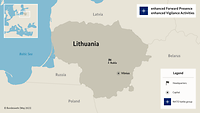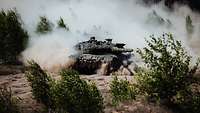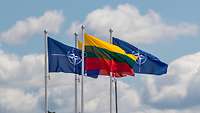
EFP
German military commitment to Lithuania
First paragraph of the articleGermany’s NATONorth Atlantic Treaty Organization commitment to Lithuania
After the illegal Russian Annexation of Crimea NATONorth Atlantic Treaty Organization Member States responded with the NATONorth Atlantic Treaty Organization Readiness Action Plan to the increasing threat from Russia. At the beginning of 2017, NATONorth Atlantic Treaty Organization began deploying robust land forces to Poland and the Baltic states. with The the mission of “enhanced Forward Presence”, which serves to secure the Eastern European NATONorth Atlantic Treaty Organization member states.
The German-led “enhanced Forward Presence Battlegroup Lithuania” currently has a strength of around 1,700 soldiers from 6 Nations. Integration into local defense structures, training and exercise is a core mission of the battlegroup. Personnel and materiel rotate in enhanced Forward Presence every six months, practicing the deployment of troops and weapon systems within Europe.
The Battlegroup is fully integrated into Lithuania's defense planning. The German-led Battlegroup is based in Rukla, about 100 kilometers northwest of Lithuania's capital Vilnius and about 100 kilometers from Russian territory. Together with multinational units from the Netherlands, Belgium, Norway, the Czech Republic, Croatia and Luxembourg, they make up the enhanced Forward Presence Battlegroup Lithuania.
The forces deploy to the Baltics with their complete equipment and all combat vehicles and ammunition: The core of the battlegroup was formed by mechanized and infantry forces. Combat support - for NBC (nuclear, biological, chemical) defense, reconnaissance or artillery - is added. This makes the enhanced Forward Presence Battlegroup in Lithuania a battle group that exceeds the scale and equipment of a conventional battalion in the German Armed Forces.
In March 2017, the operational readiness of the German enhanced Forward Presence Battlegroup was established for the first time. This is regularly verified and demonstrated during exercises.
Iron Wolf, Resolute Stallion, Saber Strike, Flaming Thunder or Eager Leopard -combat exercises are a recurring element of the enhanced Forward Presence. The Battlegroup uses all of the military training areas in Lithuania for its numerous exercise and training projects. Soldiers demonstrate multinational cooperation and defense readiness.
The German Brigade for Lithuania
Following Russia's attack on Ukraine in violation of international law in 2022, NATONorth Atlantic Treaty Organization is demonstrating its will and willingness to defend every inch of NATONorth Atlantic Treaty Organization alliance territory together.
Germany is contributing to this by assuming special responsibility towards its ally Lithuania within the framework of NATONorth Atlantic Treaty Organization.
In addition to its ongoing commitment through the German-led "enhanced Forward Presence Battlegroup" on the ground in Lithuania, Germany is currently maintaining a whole combat brigade in Germany to defend Lithuania.
The strength, equipment, and mobility of this combat brigade visibly enhance the defense readiness of Lithuania and its allies.
A so-called Forward Command Element (FCE) of the combat brigade is permanently stationed in Lithuania, where it ensures smooth integration into defense planning in close exchange with host nation and NATONorth Atlantic Treaty Organization forces.
The brigade regularly exercises the rapid deployment to Lithuania and the immediate transition to the defense of the country together with the allies in an intense exercise cycle that ensures an increased presence of Force in Lithuania.
Germany is thus consistently and purposefully continuing its role in the first line of defense of the Alliance area, in full compliance with the decisions of the 2022 NATONorth Atlantic Treaty Organization Summit in Madrid and the bilateral relations between Lithuania and Germany.

In Lithuania, Germany has been leading the NATONorth Atlantic Treaty Organization battle group since 2017. The troops are stationed in Rukla.
Germany is thus consistently and purposefully continuing its role in the first line of defense of the Alliance area, in full compliance with the decisions of the 2022 NATONorth Atlantic Treaty Organization Summit in Madrid and the bilateral relations between Lithuania and Germany.
As the surety environment remains highly volatile, and the Baltic states and Poland along NATONorth Atlantic Treaty Organization's eastern flank are particularly exposed Germany decided to assume even greater responsibility for protecting the Alliance area. Germany therefore expressed to Lithuania that it is prepared to expand the commitment within NATONorth Atlantic Treaty Organization in the long term with the permanent stationing of a brigade in Lithuania.
For this, two essential conditions must be met.
On the one hand, there is the infrastructure on site: It must be able to accommodate around 4,000 men and women of the Bundeswehr, the corresponding material - and, in the case of permanent stationing, also provide the necessary framework conditions for families. In addition to barracks, logistical facilities and military infrastructure for training and exercises, an appropriate civilian infrastructure must also be provided.
Our hosts have pledged to build up this infrastructure step by step, thus creating the structural conditions for a gradual expansion of our presence on the ground.
On the other hand, an expansion of our engagement must of course be in line with the further planning of NATONorth Atlantic Treaty Organization and our allies, fit seamlessly into the defense plans and preserve the necessary military flexibility. To this end, we are in close and continuous contact with NATONorth Atlantic Treaty Organization and our allies.
We have had a close and consensual exchange with our Lithuanian friends on these two prerequisites. We share the common understanding that they set the framework for the plans now underway for the gradual implementation of a permanent stationing in Lithuania and that their fulfillment will guide the next steps.
The goal of such a permanent stationing on NATONorth Atlantic Treaty Organization's eastern flank is ambitious - and it is new territory for Germany and the Bundeswehr. Above all, however, it is a clear expression of Germany's “Zeitenwende” as well as a change of era in action and a clear signal that we are prepared to defend our common freedom together with our friends and allies: Freedom is not for free - and that also means taking active, long-term and joint responsibility on the ground.
The Joint-Working Group
A joint Lithuanian/German expert-level working group has been established to continuously develop bilateral military coordination.
NATONorth Atlantic Treaty Organization relies on the strategy of clear deterrence without confrontation.
Quick Facts
- ~1.000 German soldiers are part of the eFP Battlegroup Lithuania.
- ~ 50 German soldiers are part of the Forward Command Element of the German Brigade for Lithuania, permanently stationed there.
- 1 German Brigade in Germany exclusively planned for Lithuania to reinforce Lithuania`s defence in case of urgent need.They regulary practice the deployment to and the Defence in Lithuania .


Share content on